- Home
- Donald Hamilton
Death of a Citizen Page 4
Death of a Citizen Read online
Page 4
“So long,” I said. “I’ll call you tomorrow night if I can, but don’t worry if you don’t hear from me. I may be camping out.”
“Matt...” she said, and then, quickly, “never mind. Just drive carefully. And send some cards to the boys; they love to get mail from you.”
Crossing the rear patio in the glare of the lights, I unlocked and pushed wide the big gates that open into the alley that runs alongside our property. In Santa Fe, you’re apt to find alleys anywhere. Before we bought the place, the studio was rented as a separate apartment, and the tenant, who didn’t have garage privileges, parked his car in the alley. I carried the suitcase into the garage and threw it into the bed of the pickup, which is covered by a metal canopy with small windows at front and sides and a door facing aft. Upon the door, for all following drivers to see, my oldest son had pasted a sticker reading: DON’T LAUGY, IT’S PAID FOR.
I opened the garage doors, drove out into the alley, closed up the garage, returned to the truck, and backed it in through the big gate and up to the studio door. Leaving the motor running to warm it up thoroughly, I went into the studio, which is an L-shaped building at the rear corner of the lot, with thick adobe walls like the main home. One wing of the L serves me as a kind of sitting and reading room, with a studio couch that becomes a bed in emergencies. Around the corner are my files and typewriter. The little cubicle next to the bathroom, which used to be the apartment kitchen, is now my darkroom.
I changed into jeans, a wool shirt, wool socks, and a pair of the light-colored, low-heeled, pull-on boots with the rough side of the leather showing that are sometimes known locally as fruit-boots, being the preferred footgear of a few gentlemen whose virility is subject to question. The appellation is doubtless unfair to a lot of very masculine engineers, not to mention, I hope, one writer-photographer. Dressed, I hauled my bedroll out to the truck, and then loaded the camera cases, as well as the little tripod for the Leicas and the big tripod for the 5x7 view camera. This last I probably wouldn’t use once in three thousand miles, but it sometimes came in handy, and driving alone I had plenty of room.
Having been a newspaper photographer before the war puts me in the pleasant position of being able to work both sides of the street. I planned to use the projected trip first for an illustrated article, after which I’d turn around and put the material into a book of fiction.
I wasn’t thinking about much of anything, now, except getting packed and away before something happened to stop me. I looked around to see what I’d forgotten, and went around the corner to my desk and reached for my keys to unlock the drawer that held the short-barreled Colt Woodsman .22. I might be a peaceful citizen now, but the little automatic pistol had been my traveling companion too long to be left behind. Starting to put the key into the lock, I saw that the drawer was already open a quarter of an inch.
I stood looking at it for perhaps a minute. Then I put the keys away and pulled the drawer fully open. There was, of course, no longer any pistol inside.
Standing there, I pivoted slowly, searching the room with my eyes. Nothing else seemed to’ve changed since I’d left the place that afternoon. The other guns were still undisturbed in their locked wall rack. I took a step to the side so that I could look back into the sitting-and-reading area. This, too, seemed unchanged. There were the usual sheaves of yellow copy paper cluttering up the furniture: I’d spent the day kicking around some story ideas I thought might fit what I expected to see in Texas. There was a Manila envelope on the arm of my big reading chair. The place is always lousy with those, too, but it occurred to me now that I hadn’t seen this particular one before.
I walked over and picked it up. It was unlabeled and unmarked. I pulled out the contents: a stapled-together manuscript of about twenty-five pages. At the top of the first painfully neat page was the title and the author’s name: mountain flower, by Barbara Herrera.
I laid down the manuscript, and walked over to the darkroom door, turned on the light, and looked inside. She wasn’t there. I found her in the bathroom. She was sitting in the tub, which was empty of water but filled instead, with the voluminous pleated skirt and frothy petticoats of her white fiesta costume. Her brown eyes, wide open and oddly dull, stared unblinkingly at the chromium faucet handles on the tiled wall before her. She was quite dead.
8
In a way, I’ll admit, it was kind of a relief. I don’t mean to sound callous, but I’d been waiting for something unpleasant to happen ever since Tina gave me the sign in the Darrels’ doorway. Now, at least, the game was open and I was getting to look at the cards. It was tough about the girl—still hoping to get me to read her damn little story, she must have slipped in here and interrupted something or somebody she shouldn’t have—but I’d had people die I’d known longer and liked better. If she’d wanted to stay healthy, she should have stayed home.
Already I had readjusted. It had happened that quickly. Three hours ago I’d been a peaceful citizen and a happily married man zipping my wife’s cocktail dress up the back and giving her a little pat on the rear to let her know I found her attractive and liked being married to her. At that time, the death of a girl—particularly a pretty girl I’d met and talked with—would have been cause for horror and dismay. Now it was just a minor nuisance. She was a white chip in a no-limits game. She was dead, and we’d never had much time for the dead. There were living people around who worried me a lot more.
Mac, I reflected, must really have been playing for high stakes, if they were authorized to knock off any casual innocent who might interfere. When necessary, we’d done it over in Europe, of course, but those had been enemy civilians in wartime. This was peace, and our own people. It seemed a little rough, even for Mac.
I frowned at the dead girl for a moment longer, feeling, in spite of everything, a certain sense of loss. She’d seemed like a nice kid, and there aren’t so many good-looking girls around you can afford to waste any.
I sighed and turned away, and went out of the bathroom, crossed the big room to the gun rack on the wall, unlocked it, and took down my old twelve-gauge pump shotgun. It bore the dust of years. I blew it clean, checked the bore for obstructions, unlocked the ammunition drawer below the rack, took out three buckshot shells, and fed them into magazine and chamber. The gun had a muzzle device, one of those adjustable-choke gadgets that let you use the same gun for everything from quail at twenty yards to geese at sixty. I set the thing to maximum dispersion, which was still not wide enough to prevent it from putting the full load of nine buckshot into a man’s chest—or a woman’s—across the room.
It had been a long time since I’d seen Mac, and his people were still, it appeared, playing for keeps. For all I knew, they considered me an outsider nowadays, in spite of the confidential signals that had been passed. It wasn’t exactly a friendly gesture, leaving dead bodies in my bathtub. If I was to have visitors before long, as seemed likely, I thought I’d feel a lot happier celebrating auld lang syne with something lethal in my fists.
I went back into the bathroom, set the shotgun by the door, rolled up my shirt sleeves, and bent over Barbara Herrera. It was time to get rid of some of the finer and more sensitive feelings I’d developed since the war. I wanted to know precisely how she’d died; from the front she showed no marks of violence. I found a swelling at the side of her head, and a bullet-hole in back; her long hair and the back of her white dress were bloodsoaked. It wasn’t hard to read the signs. She’d been taken by surprise, knocked out and carried into the bathroom, placed in the tub where the mess could easily be cleaned up later, and shot to death with a small-caliber pistol, the sound of which would have been barely audible through the thick adobe walls.
I thought I knew whose pistol had been used, and my guess was confirmed when I saw a little .22 caliber shell under the lavatory. It almost had to be from my gun; Tina went in for those little European pocket pistols with the calibers expressed in millimeters, and Frank Loris didn’t look like a precision marksman to me. If he carried a g
un at all, it would be something that would knock you down and walk all over you, like a .375 or .44 Magnum. It looked as if they were setting me up for something very pretty, or at least making quite certain of my cooperation, I reflected; and then, as I eased the dead girl gently back to her former position, I felt something between her shoulders, something hard and businesslike and unbelievable beneath the stained material of her dress.
Very much surprised, I checked my discovery. The outline was unmistakable, although I’d only met a rig like that once before. I didn’t bother to pull the bloody dress down to get at it. I knew by feel what I’d find. It would be a flat little sheath holding a flat little knife with a kind of pear-shaped symmetrical blade and maybe a couple of thin pieces of fiber-board riveted on to form a crude handle. The point and edges would be honed, but not very sharp, because you don’t make throwing knives of highly tempered steel unless you want them to shatter on impact.
It wouldn’t be much of a weapon—a quick man could duck it and a heavy coat would stop it—but it would be right there when someone pointed a gun at you and ordered you to raise your hands or, even better, clasp them at the back of your neck. Slide a hand down inside the neckline of your dress, under that long, black, convenient hair, and you were armed again. And there can be situations when even as little as five inches of not very sharp steel flickering through the air can make all the difference in the world.
Well, it hadn’t worked this time. I straightened up slowly and went to the lavatory to wash my hands, meanwhile allowing my estimate of Barbara Herrera to undergo considerable revision.
“I apologize, kid,” I said, turning. “So you weren’t just a white chip, after all?”
I looked at her thoughtfully while I dried my hands. Then I searched her thoroughly. In addition to the knife, she carried a little clip holster above the knee—one reason, I suppose, for the squaw dress with its big skirt. The holster was empty. I looked at the dead, pretty face.
“Sorry, kid,” I said. “I could have told you how it would turn out if you’d asked me. You just went up against the wrong people. You were cute and smart, but anybody could tell by looking at you that you didn’t have enough tiger in your blood. But you had me fooled, I’ll grant you that.”
There was a ghost of a knock at the studio door. I picked up the shotgun and went to answer it.
9
She made a slender, trumpet-shaped silhouette in the doorway, in her narrow, straight black dress that flared briefly at the hem, as was the current fashion—well, one of the current fashions. I can’t keep up with all of them. She stepped inside quickly, and reached back a black-gloved hand to press the door gently closed behind her. She was still dressed as she had left the Darrels’, mink and all. I took a step backward to leave a strategic amount of room between us.
Tina looked at my face and at the shotgun in my hands. It wasn’t pointed at her—when I aim a loaded firearm at someone, I like to pull the trigger—but it wasn’t pointed too far away. Deliberately, she slipped the glossy fur stole from her shoulder, folded it once, and draped it over her arm, from which a small black bag already hung by a golden chain.
“Why didn’t you turn off those stupid lights?” she asked.
I said, “I was hoping you’d find them inconvenient.”
She smiled slowly. “But what a way to greet an old friend? We are friends, are we not, chéri?”
She’d had no accent at the Darrels’, and she wasn’t really French, anyway. I’d never learned what she was. We didn’t ask that kind of question back in those days.
I said, “I doubt it. We were a lot of things to each other in a very short time, Tina, but I don’t think friends was ever one of them.”
She smiled again, shrugged her shoulders gracefully, glanced again at the shotgun, and waited for my move. I knew it had better be good. You can stand only so long threatening with a gun someone you don’t intend to shoot before the situation becomes ridiculous—the situation, and you, too.
I couldn’t afford to become ridiculous. I couldn’t afford to be the fat old saddle horse, long retired to pasture, now summoned, almost as a favor, for one last, brisk trot through the woods before the final, merciful trip to the fish-hatchery. I was good for something besides fish-food yet, or at least I hoped I was. I’d run my own shows during the war, almost from the start. Even the one on which I’d met Tina had been mine after I joined her, in the sense that I carried and gave the orders.
Mac or no Mac, if I had to be in this one—and the dead girl in the bathroom didn’t leave me much choice—I was going to run it, too. But looking at Tina, I knew it would take doing. She’d come a long way since the rainy afternoon I’d first made contact with her in a bar, pub, bierstube, or bistro—take your choice according to nationality—in the little town of Kronheim, which is French despite its Teutonic-sounding name.
To look at her then, she was just another of the shabby little female opportunists who were living well as the mistresses of German officers while their countrymen starved. I remembered the thin young body in the tight satin dress, the thin straight legs in black silk stockings, and the ridiculously high heels. I remembered the big red mouth, the pale skin, and the thin, strong cheekbones; and I remembered best the big violet eyes, at first sight as dead and dull as those with which Barbara Herrera was now contemplating the bathroom fixtures. I remembered how those seemingly lifeless eyes had shown me a flash of something fierce and wild and exciting as they caught my signal across the dark and smoky room that was filled with German voices and German laughter, the loud, overbearing laughter of the conquerors…
That had been fifteen years ago. We’d been a couple of cunning, savage kids, I only a little older than she. Now she made an elegant, adult shape against the rough-plastered wall of my studio. She had more shape and color, she was older and healthier and more attractive— and much more experienced and dangerous.
She looked at the shotgun and said, “Well, Eric?”
I made a little gesture of defeat and set the piece against the wall. Phase one was over. I wondered how it would have gone if she’d found me unarmed.
She smiled. “Eric, Liebchen,” she said, “I am glad to see you.” Now the endearments were coming through in German.
“I can’t say the same.”
She laughed and stepped forward, took my face in her gloved hands, and kissed me on the mouth. She smelled a lot better than she had in Kronheim, or even in London, later, back when soap and hot water had been expensive rarities. What her next move would have been I never found out, because as she stepped back I caught her wrist, and a moment later I’d levered her right arm up between her shoulder blades in a good old-fashioned hammerlock, and I wasn’t gentle about it, either.
“All right,” I said. “On the floor with it, querida!” She wasn’t the only one who could make with the languages. “Dump the weasels, kid. Herunten mit der mink!”
She tried for me with a thin spike heel, but I was ready for that and the latest in cocktail fashions didn’t give her much leg-room. I tightened the lock until she moaned a little through her teeth and bent forward to relieve the strain. It put her right into position, and I brought my knee up smartly, hard enough to rattle her vertebrae, against her smoothly elasticized posterior—another writer, more clever than I, has discovered a relic of Victorian modesty in the fact that, while women nowadays may admit to the ownership of two legs, upon formal occasions, at least, they must still seem to possess only a single buttock.
“I’ll break your arm, darling,” I said softly. “I’ll kick your behind right up between your ears. This is Eric, my little turtledove, and Eric doesn’t like dead girls in his bathtub. But he can get used to the idea, and it’s a goodsized tub. Now shed the pelts!”
She made no sound of assent, but the fur stole dropped to the floor, not with the slithering sound you’d expect, but with a solid, if muffled, thump. Apparently there was a pocket somewhere in that furrier’s masterpiece, and it wasn’t empty. T
his hardly came as a surprise to me.
“Now the purse, kiddo,” I said. “But gently, gently. The bones take so long to knit, and casts are so unbecoming.”
The little black bag dropped on top of the furs, but even this cushion didn’t prevent the impact from being noticeable.
“That’s two,” I said. “Let’s say mine and the Herrera’s, for the sake of argument. Now how about putting your personal hardware on display for an old friend?” She shook her head quickly. “Oh, yes, indeed, you’ve got one somewhere. Say the little Belgian Browning, or one of those pretty toy Berettas they’ve been advertising… She shook her head again, and I slid my left hand up her back and hooked my fingers into the high neck of her dress. I put some tension on it, enough to cut off her wind a bit. We heard a stitch pop somewhere. I said, “I’ve no serious objection to naked women, chiquita. Don’t make me peel you to look for it.”
“All right, damn you!” she gasped. “Stop choking me!” I released the dress, but not her wrist. There was a coy little slit in the front of the garment, through which a hint of white skin was supposed to show intriguingly as she moved. She slipped her free hand inside, brought out a tiny automatic pistol, and dropped it on top of the other stuff on the floor. I swung her away from the pile of armaments and let her go. She wheeled to face me angrily, rubbing her wrist; then she reached back with both hands to massage her bruised bottom; suddenly she was laughing.
“Ah, Eric, Eric,” she breathed. “I was so afraid, when I saw you…”
“What were you afraid of?”
“You looked so changed. Slacks, tweed jacket, a pretty little wife. And the well-fed stomach... You should watch out. You will be a human mountain, tall as you are, if you let yourself get fat. And the eyes like a steer in the pen, waiting for the butcher. I said to myself, he will not even know me, this man. But you did. You remembered.”
She was feeling of her little veiled hat as she spoke, patting her hair, pulling up her gloves and smoothing her dress; she bent over, turning half away as a woman will when her stockings need attention—then she was pivoting sharply, and there was a shining blade in her hand. I took one step back, brought my hand from my pocket, and flicked open the Solingen knife with a snap of my wrist. It’s not necessarily the most efficient way to get that type of cutlery into action when you’ve both hands free, but it looks impressive.

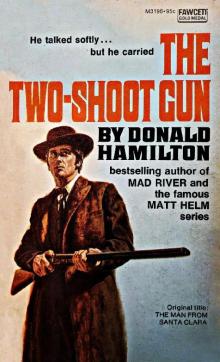 The Two-Shoot Gun
The Two-Shoot Gun Mad River
Mad River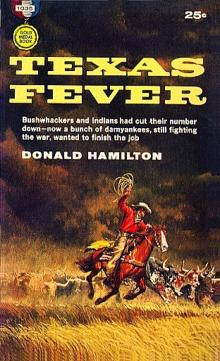 Texas Fever
Texas Fever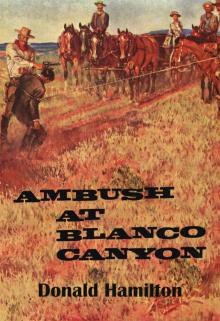 Ambush at Blanco Canyon
Ambush at Blanco Canyon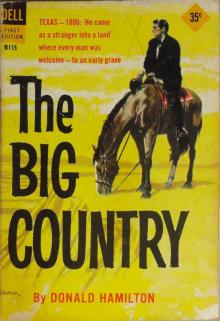 The Big Country
The Big Country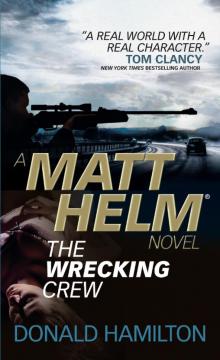 The Wrecking Crew
The Wrecking Crew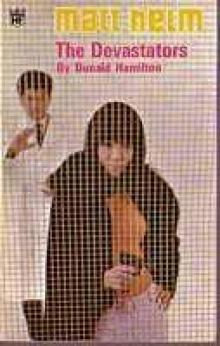 The Devastators mh-9
The Devastators mh-9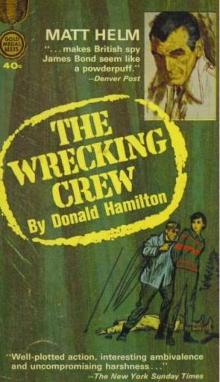 The Wrecking Crew mh-2
The Wrecking Crew mh-2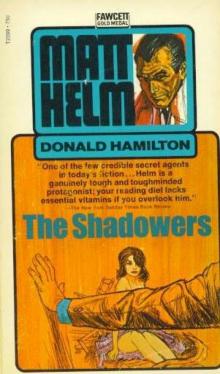 The Shadowers mh-7
The Shadowers mh-7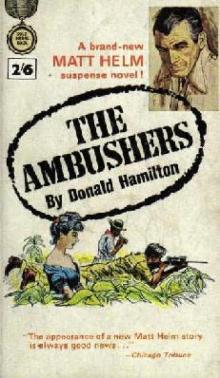 The Ambushers mh-6
The Ambushers mh-6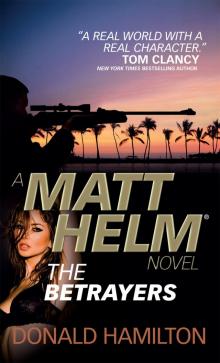 The Betrayers
The Betrayers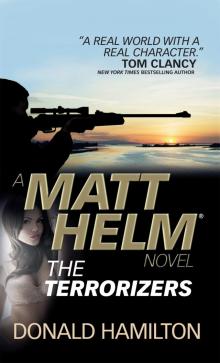 The Terrorizers
The Terrorizers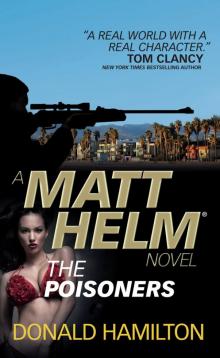 The Poisoners
The Poisoners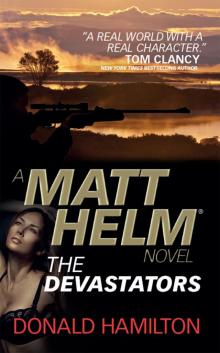 The Devastators
The Devastators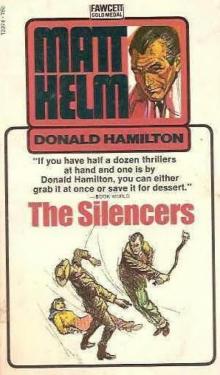 The Silencers mh-5
The Silencers mh-5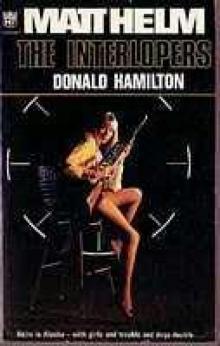 The Interlopers mh-12
The Interlopers mh-12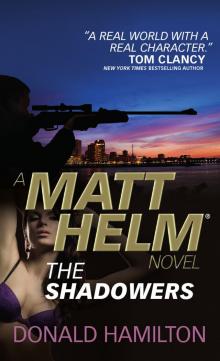 The Shadowers
The Shadowers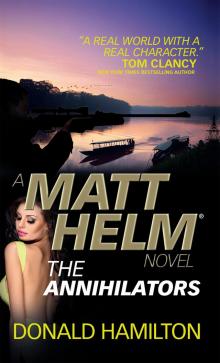 The Annihilators
The Annihilators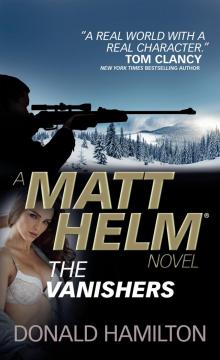 The Vanishers
The Vanishers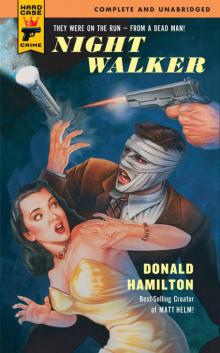 Night Walker
Night Walker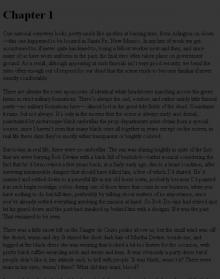 The Revengers
The Revengers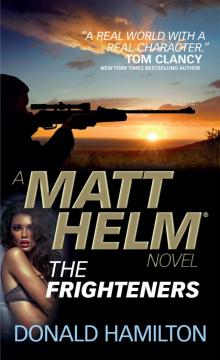 The Frighteners
The Frighteners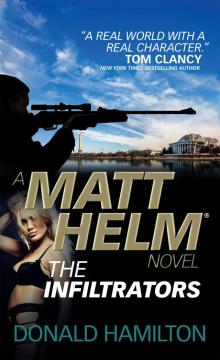 The Infiltrators
The Infiltrators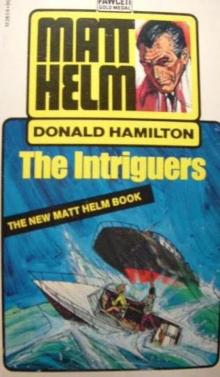 The Intriguers mh-14
The Intriguers mh-14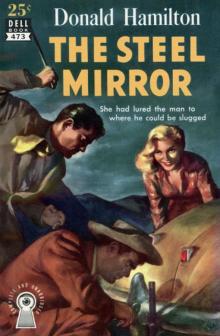 The Steel Mirror
The Steel Mirror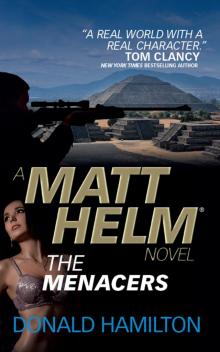 The Menacers
The Menacers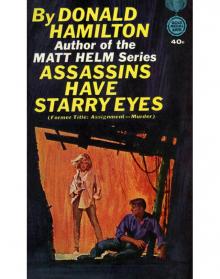 Assassins Have Starry Eyes
Assassins Have Starry Eyes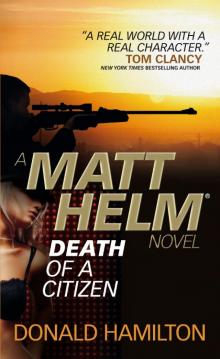 Death of a Citizen
Death of a Citizen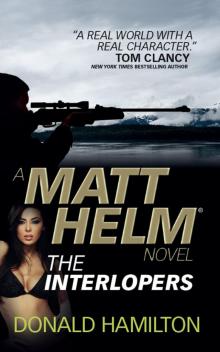 Matt Helm--The Interlopers
Matt Helm--The Interlopers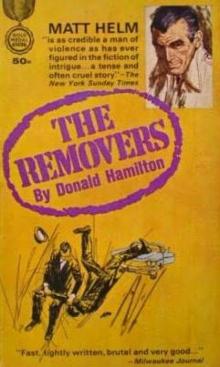 The Removers mh-3
The Removers mh-3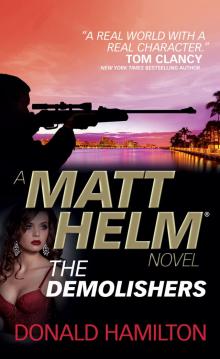 The Demolishers
The Demolishers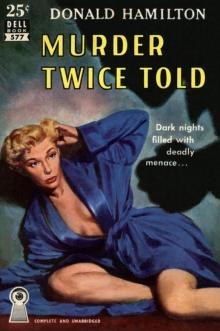 Murder Twice Told
Murder Twice Told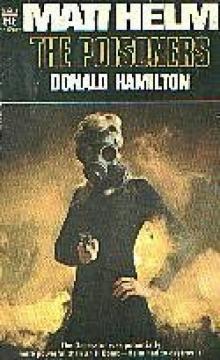 The Poisoners mh-13
The Poisoners mh-13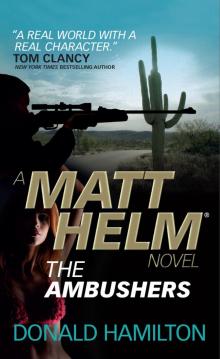 The Ambushers
The Ambushers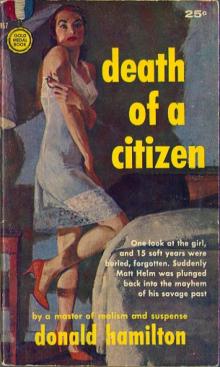 Death of a Citizen mh-1
Death of a Citizen mh-1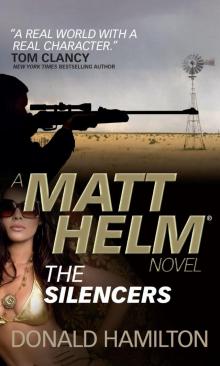 The Silencers
The Silencers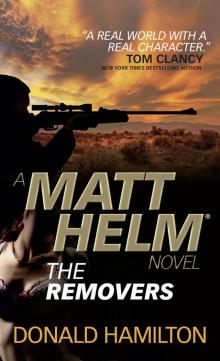 The Removers
The Removers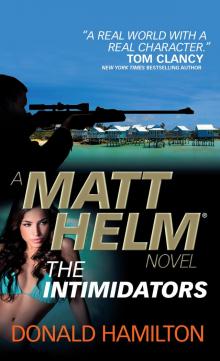 The Intimidators
The Intimidators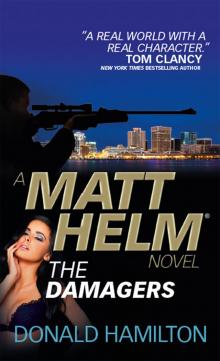 The Damagers
The Damagers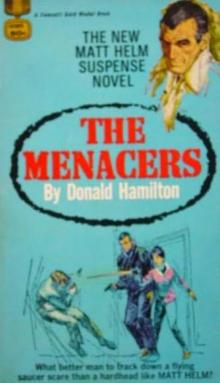 The Menacers mh-11
The Menacers mh-11 The Retaliators
The Retaliators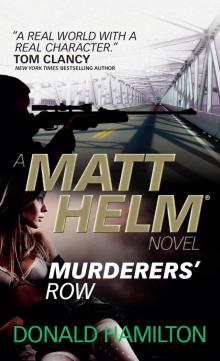 Murderers' Row
Murderers' Row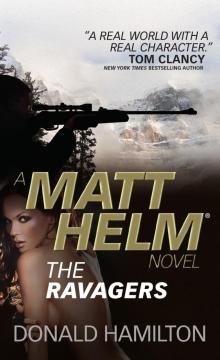 The Ravagers
The Ravagers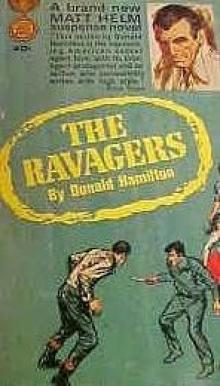 The Ravagers mh-8
The Ravagers mh-8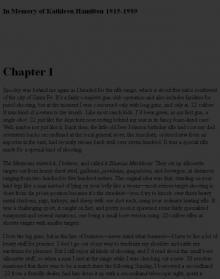 The Threateners
The Threateners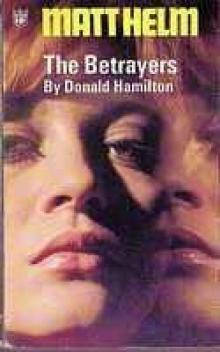 The Betrayers mh-10
The Betrayers mh-10